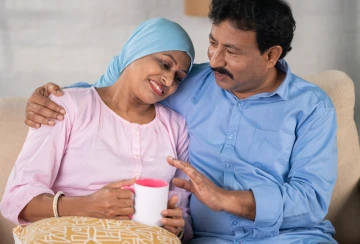Nutrition during cancer treatment
University of Arizona Cancer Center Holistic Care Program
- Good nutrition plays a key role during cancer treatment and good food choices can help you manage the side effects of treatment, support your immune system, reduce fatigue, promote recovery, and maintain muscle mass and strength.
- Cancer treatments can cause side effects that affect your appetite, sense of taste and smell. The foods you eat may not be absorbed as effectively as usual, which can result in malnutrition.
Some common side effects of cancer treatment and tips to manage them include:
Image
Appetite Loss- try eating several small meals throughout the day instead of three larger meals.
Nausea and Vomiting- choose bland foods such as crackers, gelatin, toast, plain yogurt, mashed potatoes, and clear broths.
Mouth Sores- opt for cold foods and drinks, like popsicles and frozen yogurt, or soft foods that are easy to swallow. Avoid acidic and spicy foods
Chemotherapy can lower white blood cell levels, increasing the risk of infections, including foodborne illnesses caused by harmful microorganisms. Therefore, it is important to handle and prepare food safely.
Image
Clean Wash your hands and surfaces often. Be sure to wash your hands for at least 20 seconds before, during and after preparing food, as well as before eating.
Separate Keep raw or marinating meats, poultry, and seafood separate from other foods in the refrigerator.
Cook Use a food thermometer to ensure that food is cooked at a safe internal temperature.
Chill Thaw frozen foods in the refrigerator or microwave. Bacteria can multiply quickly at room temperature.
To learn more
Banner UACC dietitians
Yolanda Fahrney, RDN, CNSC
Liz Graham, RDN, CDCES
Ghaidaa Kobeissi, RDN, CSO, CNSC
Phone: 520-694-2873



